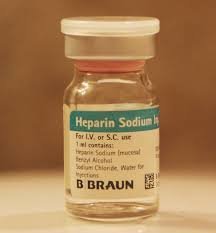| Category of Drug | Heparin is a Drug Affecting Coagulation |
| Mechanism of Action | |
| Indications | Heparin is used for 1. Treatment and prophylaxis of deep-vein thrombosis and pulmonary embolism 2. Atrial fibrillation with embolism 3. Treatment and prophylaxis of peripheral arterial embolism 4. Prophylaxis of deep vein thrombosis in major surgery 5. Lipemia clearing |
| Well Known Pharmaceutical Brands | |
| Available dosage forms | INJECTION |
| Dose | |
| Contraindications | 1. Hypersensitivity to heparin 2. Haemophilia and other haemorrhagic disorders 3. Thrombocytopenia 4. Peptic ulcer 5. Recent cerebral haemorrhage 6. Severe hypertension 7. Severe liver or renal disease 8. After major trauma or recent surgery 9. Lumbar puncture 10. Chronic alcoholics 11. Acetylsalicylic acid and other antiplatelet drugs |
| Precautions | 1. Hepatic impairment 2. Renal failure 3. Hypersensitivity to low molecular weight heparins 4. Spinal or epidural anaesthesia-risk of spinal haematoma; 5. Diabetes Mellitus 6. Acidosis 7. Concomitant potassium-sparing drugs-increased risk of hyperkalaemia 8. Lactations 9. Pregnancy 10. Interactions 11. Paediatrics 12. Elderly |
| Adverse Effects | 1. Immune-mediated thrombocytopenia usually developing 6 to 10 days after commencement of therapy 2. Haemorrhage 3. Skin necrosis 4. Hypersensitivity reactions 5. osteoporosis after prolonged use 6. Alopecia 7. Bleeding due to overdose |
| Pregnancy Category | C |


Pingback: Aspirin: Antithrombotic Drug and its Pharmacology > PharmaCampus